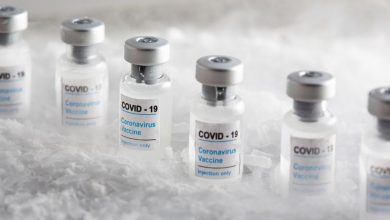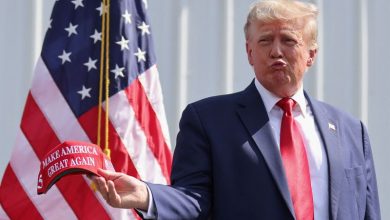Malaria drug Trump touted as Covid cure increased chance of death – study
Study calculated that there was an 11% increase in mortality associated with cases involving the use of hydroxychloroquine

People who took an anti-malaria treatment that Donald Trump touted as a cure for Covid-19 in the early days of the pandemic and waning days of his presidency were 11% more likely to die from the virus, according to a new scientific study.
The study’s authors – who published their findings in the peer-reviewed Biomedicine & Pharmacotherapy journal – also estimated that nearly 17,000 people in six different countries, including the US, died after contracting Covid-19 and taking the antimalarial hydroxychloroquine.
Doctors who prescribed hydroxychloroquine to treat Covid-19 at the height of activity restrictions meant to slow the spread of the virus did so off-label and without evidence that there was any clinical benefit, as the authors of the new study noted. The study’s conclusions “illustrate the hazard of drug repurposing with low-level evidence for the management of future pandemics”, its authors added.
A meta-analysis of randomized trials produced the findings in the study released by Biomedicine & Pharmacotherapy, a 67-year-old journal edited by DM Townsend of the Medical University of South Carolina.
The study’s authors said they used public databases to establish the number of Covid-19 patients who were hospitalized during the early days of the pandemic. They said they then systematically reviewed 44 cohort studies to calculate that there was an 11% increase in mortality associated with cases involving the use of hydroxychloroquine, along with about 16,990 in-hospital deaths in the US, Belgium, France, Italy, Spain and Turkey.
Trump first hawked hydroxychloroquine as a miracle drug that could cure Covid-19 in March 2020 as he railed against activity lockdowns, saying they would ruin the US economy.
His remarks about anti-malaria medication led to a surge in prescriptions for the drug. The Food and Drug Administration – which didn’t approve the first Covid-19 vaccine until December 2020 – was forced to warn that hydroxychloroquine could cause irregular heartbeats and other cardiac trouble.
And the regulatory agency also clarified that the medication had only been approved to treat malaria, lupus and rheumatoid arthritis.
The then-president later dismissed an early study which showed hydroxychloroquine was an ineffective Covid-19 treatment as a “Trump enemy statement”.
“They were giving it to people that were … almost dead,” Trump said at one point as the White House claimed he himself was taking the medication prophylactically.
Trump ultimately tested positive for Covid-19 on 26 September 2020 and was hospitalized within days. He recovered after doctors treated him with a new antibody cocktail that was nearly impossible for the general public to access.
Weeks later, Trump lost his bid for a second term in the Oval Office to Joe Biden. He is now facing 91 pending criminal charges for attempting to subvert his electoral defeat, illegally retaining government secrets, and hush-money payments to an adult film actor who has alleged an extramarital sexual encounter with him.
He has also been targeted with civil litigation over his business practices and a rape allegation which a judge has determined was “substantially true”.
Trump nonetheless is leading the race for the 2024 Republican presidential nomination, and polls have suggested a rematch with Biden would be competitive.
Before the US Centers for Disease Control and Prevention stopped keeping track in May, more than 1.1 million people had died from Covid-19 in the US, and nearly 105m cases had been reported, according to officials.












